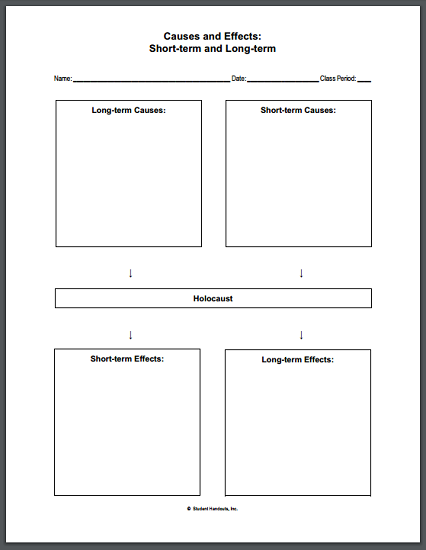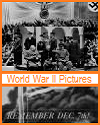| Holocaust Causes and Effects DIY Infographic Worksheet |
|---|
| studenthandouts.com > World History > WWII in World History > WWII in World History Worksheets |
| Students are asked to list and describe both the short-term and the long-term causes and effects of the Holocaust which occurred during the Second World War. |
|---|
 |  |
|---|
| Click here to print this DIY infographic worksheet on the Holocaust in World War II (PDF file). Answers will vary. |
|---|
|
Short-Term Causes of the Holocaust: Nazi Ideology and Anti-Semitism: The Nazi regime, led by Adolf Hitler, propagated extreme anti-union, anti-LGBTQ+, and anti-Semitic beliefs, viewing these groups as enemies and threats to the Aryan race. Nuremberg Laws (1935): These laws institutionalized racial discrimination against Jews in Germany, stripping them of citizenship and civil rights, setting the stage for their systematic persecution. Kristallnacht (1938): The "Night of Broken Glass" saw widespread violence against Jews, including the destruction of synagogues and Jewish businesses, escalating the regime's anti-Semitic actions. Invasion of Poland (1939): The occupation of Poland brought millions of Jews, trade unionists, and other groups, under Nazi control, providing the Nazis with the logistical capacity to carry out mass deportations and killings. Long-Term Causes of the Holocaust: Historical Anti-Semitism in Europe: Centuries of deep-rooted anti-Semitic attitudes and discrimination in European societies provided a fertile ground for Nazi propaganda. World War I Aftermath: Economic instability, political upheaval, and social discontent in Germany post-World War I created an environment in which extremist ideologies could flourish. Failure of International Intervention: The lack of strong international response to early Nazi aggression and anti-Semitic policies allowed the regime to escalate its persecution of Jews and unionists without significant external pressure. Additionally, there were many voices of support for Hitler and his ideas within the countries that later constituted the Allies. Short-Term Effects of the Holocaust: Death of Millions: Approximately six million Jews, along with millions of others including Romani people, disabled individuals, political prisoners, trade unionists, and others, were murdered in concentration and extermination camps. Destruction of Communities: Entire Jewish communities across Europe were obliterated, resulting in profound cultural and demographic losses. Displacement and Refugees: Survivors of the Holocaust were often left without homes or families, leading to widespread displacement and the creation of numerous refugee populations. Nuremberg Trials (1945-1946): Key Nazi officials were tried and held accountable for war crimes and crimes against humanity, establishing legal precedents for prosecuting such atrocities. Long-Term Effects of the Holocaust: Creation of Israel (1948): The Holocaust significantly increased support for the establishment of the State of Israel as a homeland for Jewish survivors (although Zionism had begun urging Jewish immigration into British Palestine for approximately half a century before the end of World War II), altering geopolitical dynamics in the Middle East. Human Rights Movement: The atrocities of the Holocaust spurred the development of international human rights frameworks, including the Universal Declaration of Human Rights in 1948. Holocaust Education and Memorials: Efforts to remember and educate about the Holocaust have led to the creation of museums, memorials, and educational programs worldwide to ensure such atrocities are not forgotten. Impact on Jewish Identity and Culture: The Holocaust profoundly affected Jewish identity, culture, and diaspora, influencing collective memory and cultural practices. These causes and effects highlight the profound and lasting impact of the Holocaust on individuals, communities, nations, and international relations, underscoring the importance of remembrance and education to prevent future atrocities. |
| World War II Books and Films | World War II Outlines and PowerPoints |
| World War II Study Games | World War II Maps and Pictures |
| World War II Miscellany | World War II Worksheets |
| studenthandouts.com > World History > WWII in World History > WWII in World History Worksheets |











